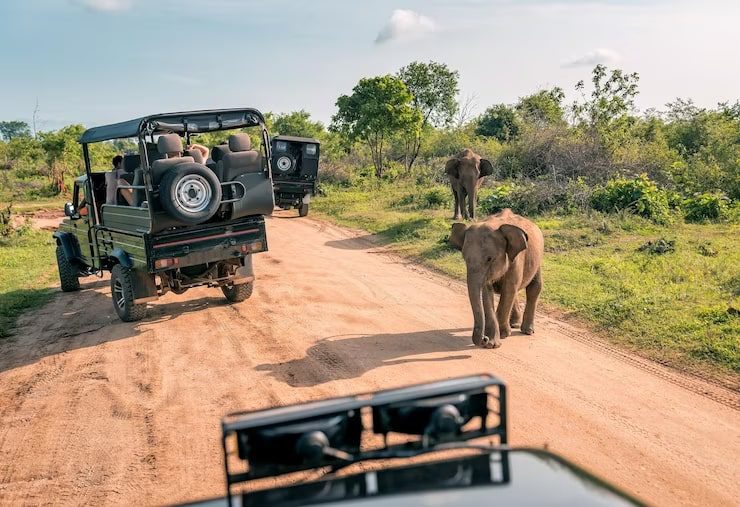The allure of the African savanna, the call of the wild, and the thrill of spotting majestic creatures in their natural habitat – safari experiences offer a glimpse into a world untouched. But for many, the question lingers: is a safari trip truly compatible with wildlife conservation? The answer is a resounding yes, but only if we choose sustainable safari experiences that prioritize the well-being of animals and their ecosystems.
So, what makes a safari travel sustainable? It’s not just about scenic jeep rides and luxurious accommodations. It’s about a holistic approach that encompasses:
Responsible Wildlife Viewing:
Respecting animal behavior and minimizing disruption to their natural routines is crucial. This means keeping a safe distance, adhering to designated viewing areas, and avoiding excessive noise or off-road driving with minimal interference. Opt for safari operators who utilize low-emission vehicles, minimizing environmental impact. Hybrid or electric options are becoming increasingly available eco-friendly vehicles, reducing carbon footprint and noise pollution.
Trained, ethical guides, and knowledgeable guides who prioritize animal welfare and conservation principles are essential. They understand animal behavior, ensure responsible viewing practices, and educate guests on conservation efforts.
Supporting Conservation Initiatives:
Partner with reputable organizations. Choose safari operators actively involved in conservation projects, contributing directly to wildlife protection and habitat restoration. Look for certifications like WTTC’s Travelife for Sustainable Wildlife Watching or Global Sustainable Tourism Council (GSTC) accreditation.
Involve with communities. Supporting local communities directly benefits conservation efforts. Look for operators who employ local guides, purchase supplies from local businesses, and invest in community development projects.
Take anti-poaching initiatives. Contributing to anti-poaching efforts directly protects wildlife. Choose operators who support ranger patrols, education programs, and technology advancements that combat poaching.
Minimizing Environmental Footprint:
Perform responsible waste management. Opt for operators who minimize waste generation, properly dispose of waste, and support recycling initiatives. Look for compost toilets, reusable water bottles, and biodegradable products. Perform water conservation practices. Water scarcity is a major challenge in many safari travel regions.
Choose operators who utilize water-saving practices, educate guests on conservation, and support local water projects. Look for operators who utilize solar power, wind energy, or other renewable energy sources to reduce their reliance on fossil fuels and minimize their environmental impact.
The Benefits of Sustainable Safari:
Choosing a sustainable safari isn’t just about ticking boxes; it’s about making a conscious choice. It ensures your travel experience contributes to:
Protecting wildlife: Your trip actively supports conservation efforts, ensuring the survival of endangered species and protecting their habitats.
Preserving Biodiversity: Sustainable safari travel practices actively contribute to the preservation of biodiversity by protecting natural habitats and supporting conservation initiatives aimed at safeguarding endangered species.
Cultural Enrichment: Engaging with local communities fosters cultural exchange, providing travelers with a richer, more immersive experience while simultaneously supporting the well-being of indigenous populations.
Long-Term Economic Impact: By prioritizing sustainability, safari travel can contribute to long-term economic benefits for local communities, creating a positive cycle of conservation and economic development.
Education and Awareness: Sustainable safaris serve as educational platforms, raising awareness about the importance of wildlife conservation and inspiring travelers to become advocates for environmental protection.
Elevated Visitor Experience: Sustainable safari practices enhance the overall visitor experience by providing authentic encounters with wildlife in their natural habitats, leaving a lasting impression and appreciation for the beauty of nature.
Conclusion
Sustainable safari travel is not just a trend; it’s a crucial paradigm shift that harmonizes our desire to explore the wonders of the natural world with a commitment to preserving it. As travelers, we have the power to make choices that support conservation efforts and promote responsible tourism practices. By embracing sustainable safaris, we not only contribute to the well-being of our planet’s biodiversity but also create unforgettable experiences that echo the delicate balance of nature for generations to come. Let us embark on a journey where the thrill of the safari is matched only by the responsibility to protect and cherish the wild landscapes we are privileged to explore.







